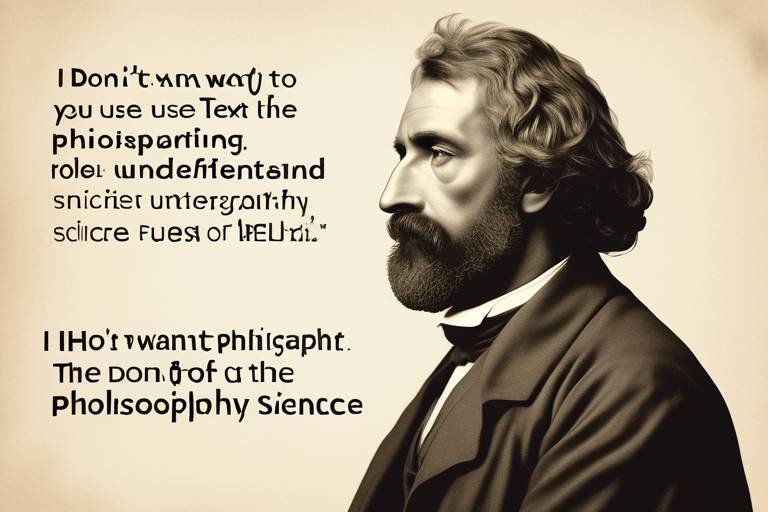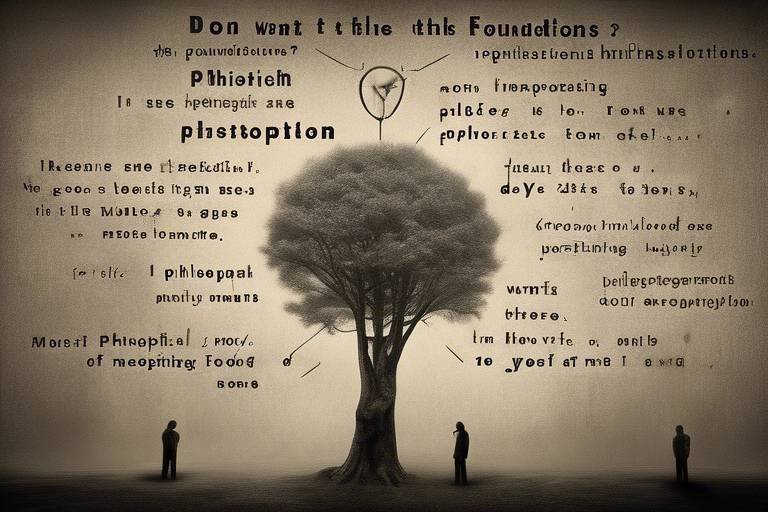The Role of Philosophy in Understanding Science
Philosophy and science are often seen as separate realms of inquiry, but in reality, they are deeply intertwined. As we dive into the fascinating world of scientific principles and methodologies, it's essential to recognize how philosophy shapes our understanding of these concepts. This article explores how philosophical inquiry not only enriches scientific discovery but also challenges our perceptions of knowledge, truth, and reality. Just imagine science as a magnificent tapestry woven from threads of observation and experimentation, with philosophy serving as the loom that holds everything together. Without this foundational support, the intricate patterns of scientific understanding could unravel.
At its core, philosophy provides the foundational concepts that underpin scientific inquiry. It influences how we define knowledge, truth, and reality—elements that are crucial for scientific theories and practices. For instance, when scientists embark on a quest to uncover the mysteries of the universe, they are not just collecting data; they are engaging in a philosophical dialogue about what it means to know something. The questions raised by philosophers about the nature of existence and the limits of human understanding shape the very framework within which scientific exploration occurs. Think of philosophy as the compass that guides scientists through the uncharted waters of discovery, helping them navigate the complexities of their findings.
Epistemology, the study of knowledge, is another critical area where philosophy intersects with science. It examines how we acquire, validate, and justify scientific knowledge, addressing fundamental questions about belief, justification, and the nature of evidence. When scientists present their findings, they are not merely reporting observations; they are making claims that require justification. This is where epistemology comes into play, challenging us to consider the reliability of our evidence and the processes through which we arrive at our conclusions. It's like being a detective, piecing together clues to form a coherent narrative about the natural world. But what happens when those clues lead us astray?
One of the most intriguing dilemmas in epistemology is the problem of induction. This issue raises critical questions about the validity of generalizing from specific observations. For example, just because the sun has risen every day of our lives does not guarantee it will rise tomorrow. This challenge to our understanding of scientific reasoning forces us to reconsider how we interpret empirical data. Can we truly trust our observations to reflect reality? The implications of this problem reverberate throughout scientific methodology and theory development, compelling scientists and philosophers alike to grapple with the uncertainty inherent in inductive reasoning.
Philosophers throughout history, such as David Hume and Karl Popper, have significantly shaped the discourse on induction. Hume famously argued that our belief in causation is not grounded in rational justification but rather in habit and custom. On the other hand, Popper introduced the concept of falsifiability as a criterion for scientific theories, suggesting that rather than proving theories true through induction, we should focus on attempting to disprove them. These historical perspectives illuminate the limitations of induction and encourage a more critical approach to scientific methodology.
In response to the problem of induction, modern philosophers have proposed various solutions, including Bayesian approaches and the role of probability. Bayesianism offers a framework for updating our beliefs in light of new evidence, allowing for a more flexible understanding of scientific reasoning. By incorporating probability, scientists can better reconcile empirical observations with theoretical frameworks, creating a more robust model for understanding the complexities of the natural world. It's like having a safety net that catches us when we fall, allowing us to explore the unknown without losing our footing.
The debate between scientific realism and anti-realism further complicates our understanding of scientific knowledge. Scientific realism posits that scientific theories accurately describe reality, while anti-realism suggests that these theories are merely useful tools for predicting phenomena. This debate impacts how we interpret scientific progress and truth. Are we uncovering the fabric of the universe, or are we simply creating models that help us navigate it? This question invites us to reflect on the nature of scientific inquiry and the philosophical assumptions that underlie our interpretations.
Philosophy also plays a vital role in guiding ethical considerations in scientific research. It influences how scientists approach issues such as integrity, responsibility, and the societal implications of their work. In an age where technological advancements can have profound effects on humanity, ethical frameworks are essential for ensuring that scientific progress aligns with moral standards. Without a solid ethical foundation, scientific endeavors risk becoming tools of exploitation rather than instruments of enlightenment.
Various ethical frameworks, including utilitarianism and deontology, provide guidance for researchers in making moral decisions. Utilitarianism focuses on maximizing overall happiness, while deontology emphasizes the importance of duty and moral principles. By applying these frameworks, scientists can ensure that their advancements benefit society without compromising ethical standards. For instance, when conducting medical research, scientists must weigh the potential benefits against the risks to participants, embodying the ethical responsibility that comes with their work.
Examining historical case studies, such as the Tuskegee Syphilis Study, reveals the importance of ethical considerations in scientific research. This infamous study, which misled African American men about their treatment for syphilis, highlights the devastating consequences of neglecting ethical responsibilities. Such examples serve as stark reminders that the pursuit of knowledge must always be tempered with a commitment to ethical integrity. In the end, the intersection of philosophy and science is not just an academic exercise; it’s a matter of humanity.
- How does philosophy influence scientific research?
Philosophy shapes the foundational concepts of knowledge, truth, and reality, guiding how scientists interpret their findings. - What is the problem of induction?
The problem of induction questions the validity of generalizing from specific observations, challenging our understanding of scientific reasoning. - Why are ethical considerations important in science?
Ethical considerations ensure that scientific advancements benefit society and uphold moral standards, preventing exploitation and harm.

Philosophical Foundations of Science
When we dive into the realm of science, we often think of it as a world governed by facts, experiments, and concrete data. However, beneath this surface lies a rich tapestry woven from the threads of philosophical inquiry. Philosophy serves as the bedrock of scientific exploration, shaping how we perceive and define essential concepts like knowledge, truth, and reality. These foundational ideas are not merely academic; they are critical for the development of scientific theories and practices.
At its core, philosophy compels us to ask fundamental questions that guide scientific inquiry. For instance, what constitutes a valid scientific theory? How do we determine whether a claim is true? These questions are not just rhetorical; they are pivotal in framing the methodologies scientists employ to explore the universe. Consider the analogy of a house: just as a house needs a solid foundation to stand tall, science requires a philosophical basis to support its claims and discoveries.
One of the most significant contributions of philosophy to science is its role in shaping our understanding of methodology. Philosophers like Karl Popper have influenced the scientific method, emphasizing the importance of falsifiability. This principle asserts that for a theory to be considered scientific, it must be testable and refutable. Without such criteria, we risk floating in a sea of speculation, where anything can be claimed without the burden of proof.
Moreover, philosophy encourages a critical examination of the assumptions underlying scientific practices. For instance, the assumption that the laws of nature are consistent across time and space is a philosophical stance that scientists often take for granted. This leads us to ponder: what if these laws could change? Such questions may seem abstract, but they are essential for understanding the limits and potential of scientific inquiry.
In addition to these foundational concepts, philosophy also helps scientists grapple with the implications of their work. For example, when scientists make breakthroughs in fields like genetics or artificial intelligence, they must consider the ethical ramifications of their discoveries. Philosophy provides the tools to navigate these complex moral landscapes, ensuring that scientific advancements contribute positively to society rather than causing harm.
To summarize, the philosophical foundations of science are not just an academic exercise; they are vital for the integrity and progress of scientific inquiry. By fostering a deeper understanding of knowledge, truth, and ethical responsibility, philosophy enriches the scientific landscape, enabling us to explore the mysteries of the universe with both rigor and conscience.

Epistemology and Scientific Knowledge
When we dive into the realm of epistemology, we're essentially pondering the very essence of knowledge itself. What does it mean to know something? How do we come to acquire that knowledge? These questions are pivotal in the context of scientific inquiry. Science is not just about collecting data; it's about understanding how that data translates into knowledge that we can trust and utilize. In this sense, epistemology serves as a compass, guiding scientists through the murky waters of belief, justification, and evidence.
At its core, epistemology examines the processes through which we validate our scientific claims. It asks: how do we distinguish between what we know and what we merely believe? This distinction is crucial, especially in science, where empirical evidence plays a significant role. For instance, consider the process of forming a scientific hypothesis. A scientist may observe a phenomenon and propose a hypothesis based on that observation, but how do they justify that hypothesis? This is where epistemological inquiry becomes essential, as it helps clarify the methods we use to gather evidence and the standards by which we assess its validity.
One of the most profound challenges in epistemology is the problem of induction. This problem highlights the difficulty of generalizing findings from specific observations. For example, just because the sun has risen in the east every day of our lives, does that guarantee it will rise in the east tomorrow? This question not only challenges our understanding of scientific reasoning but also forces us to reconsider how we interpret empirical data. The implications are vast, as they touch on the reliability of scientific theories and the very nature of scientific progress.
Historically, philosophers like David Hume and Karl Popper have tackled the problem of induction, offering insights that have shaped the discourse around scientific methodology. Hume raised the concern that our reliance on past experiences to predict future events is inherently flawed. He argued that while we may observe patterns, we cannot definitively conclude that these patterns will continue. On the other hand, Popper introduced the idea of falsifiability, suggesting that scientific theories should be structured in a way that allows them to be tested and potentially disproven. This perspective shifts the focus from proving theories to challenging them, fostering a more rigorous scientific approach.
Throughout history, the discussions surrounding induction have evolved, with various philosophers contributing to our understanding. Here’s a brief overview:
| Philosopher | Contribution |
|---|---|
| David Hume | Questioned the validity of inductive reasoning and its reliance on past experiences. |
| Karl Popper | Proposed falsifiability as a criterion for scientific theories, emphasizing the role of testing. |
| Imre Lakatos | Developed the methodology of scientific research programs to address the limitations of induction. |
In modern discourse, philosophers have proposed various solutions to the problem of induction. One prominent approach is the Bayesian perspective, which incorporates probability into the evaluation of evidence. By viewing scientific claims through a probabilistic lens, researchers can better reconcile empirical observations with theoretical frameworks. This method allows for a more nuanced understanding of scientific knowledge, acknowledging that certainty is often elusive and that our beliefs can be adjusted based on new evidence.
Ultimately, the interplay between epistemology and scientific knowledge is a dynamic one. It challenges us to continually refine our understanding of what it means to know and to question the very foundations upon which scientific inquiry is built. As we navigate this intricate landscape, we are reminded that science is not just a collection of facts; it is a profound exploration of the world around us, shaped by our philosophical inquiries.
- What is epistemology? Epistemology is the branch of philosophy that studies the nature, origin, and limits of knowledge.
- How does epistemology relate to science? Epistemology provides the framework for understanding how scientific knowledge is acquired, validated, and justified.
- What is the problem of induction? The problem of induction questions the validity of making generalizations based on specific observations.
- Who are some key philosophers in the study of induction? Key figures include David Hume, Karl Popper, and Imre Lakatos.
- What are contemporary solutions to the problem of induction? Modern philosophers often use Bayesian approaches to integrate probability into the evaluation of scientific claims.

The Problem of Induction
The problem of induction is a captivating philosophical dilemma that has puzzled thinkers for centuries. At its core, this issue questions the validity of drawing general conclusions from specific instances. Imagine you’re observing a flock of white swans; every swan you see is white. You might conclude that all swans are white. However, this leap of reasoning is precisely where the problem lies. What happens when you encounter a black swan? This scenario illustrates the inherent uncertainty in inductive reasoning, prompting us to ask: Can we ever truly know something based solely on repeated observations?
Historically, philosophers like David Hume have been at the forefront of this discussion, arguing that while we rely on induction daily, it lacks a solid logical foundation. Hume suggested that our belief in the uniformity of nature—that the future will resemble the past—is not something we can justify rationally. Instead, it’s a habit of thought, a psychological instinct rather than a logical certainty. This perspective forces us to confront the limitations of empirical data and the reliability of our scientific reasoning.
As we delve deeper, we find that the implications of the problem of induction are vast, affecting how scientific theories are developed and validated. For instance, in the scientific method, researchers often gather data and form hypotheses based on observed patterns. Yet, if those patterns are not universally applicable, what does that mean for the conclusions drawn from them? This uncertainty can lead to significant challenges in various scientific fields, from physics to biology.
To better understand the problem of induction, we can categorize its implications into several key areas:
- Scientific Methodology: How do scientists justify their methods and conclusions?
- The Nature of Scientific Theories: Are theories absolute truths or merely useful approximations?
- Empirical Data Reliability: Can we trust data collected through observation alone?
In response to these challenges, contemporary philosophers have proposed several solutions to the problem of induction. Some advocate for a Bayesian approach, which incorporates probability into the reasoning process, suggesting that while we cannot guarantee absolute certainty, we can assign degrees of belief based on the evidence available. Others emphasize the importance of theoretical frameworks that can help interpret empirical data in a more reliable manner.
Ultimately, the problem of induction serves as a reminder of the complexities inherent in scientific inquiry. It challenges us to remain vigilant and critical, urging us to question the very foundations of our knowledge and understanding. As we navigate the intricate dance between observation and theory, we must acknowledge that while science strives for certainty, it operates within a realm of probabilities and assumptions that are often beyond our immediate grasp.

Historical Perspectives on Induction
The historical perspectives on induction are pivotal in understanding the evolution of scientific methodology and philosophy. One of the most significant figures in this discourse is David Hume, an 18th-century philosopher who famously questioned the validity of inductive reasoning. Hume argued that while we often observe patterns in nature, such as the sun rising every day, we cannot logically justify that these patterns will continue indefinitely. This skepticism about induction leads to what is now known as the Problem of Induction, which raises critical questions about how we can claim to know anything about the future based on past experiences.
Hume’s insights prompted further exploration into the nature of scientific reasoning. For instance, Karl Popper, a 20th-century philosopher, proposed a solution by suggesting that science should not rely on induction but rather on falsifiability. In Popper's view, a theory is scientific only if it can be tested and potentially disproven. This perspective shifted the focus from confirming hypotheses through repeated observations to actively seeking evidence that could refute them. This approach has significantly influenced modern scientific practices, encouraging a more rigorous testing of theories.
Moreover, the debate surrounding induction has not only been limited to Hume and Popper. Other philosophers like Imre Lakatos and Thomas Kuhn have also contributed to the discussion, each bringing their unique perspectives. Lakatos introduced the concept of research programs, suggesting that scientific theories evolve through a series of progressive and degenerative phases. Meanwhile, Kuhn emphasized the role of paradigms in scientific revolutions, arguing that shifts in scientific consensus often occur not through linear progression but through radical changes in the underlying frameworks that guide scientific inquiry.
In summary, the historical perspectives on induction reveal a rich tapestry of philosophical thought that continues to shape our understanding of scientific methodology. The contributions of Hume, Popper, Lakatos, and Kuhn illustrate the ongoing dialogue between philosophy and science, highlighting the complexities that arise when we attempt to generalize knowledge from specific instances. This interplay is essential for appreciating the nuances of scientific inquiry and the philosophical underpinnings that inform it.
- What is the Problem of Induction? The Problem of Induction refers to the philosophical question of whether inductive reasoning, which involves making generalizations based on specific observations, can be justified.
- Who are the key philosophers associated with induction? Key philosophers include David Hume, Karl Popper, Imre Lakatos, and Thomas Kuhn, each contributing unique insights into the nature of scientific reasoning.
- How does induction relate to scientific methodology? Induction is central to scientific methodology as it forms the basis for forming hypotheses and theories based on empirical observations.

Contemporary Solutions to Induction
The problem of induction has long perplexed philosophers and scientists alike. This issue revolves around how we can justify our beliefs about the future based on past observations. In simpler terms, just because the sun has risen every day of our lives, can we confidently assert it will rise again tomorrow? This is where contemporary solutions come into play, offering fresh perspectives and frameworks to tackle this age-old dilemma.
One of the most significant advancements in addressing the problem of induction is the Bayesian approach. Bayesianism provides a robust mathematical framework that allows scientists to update their beliefs in light of new evidence. By using probabilities, researchers can quantify their uncertainty and gradually refine their theories as more data becomes available. This method acknowledges that while complete certainty may be unattainable, we can still make informed predictions based on prior knowledge and observed outcomes.
Another noteworthy solution is the emphasis on the role of probability in scientific reasoning. Instead of viewing scientific theories as definitive truths, contemporary philosophers suggest that these theories should be seen as useful approximations of reality. This perspective aligns with the idea that science is an evolving discipline, where theories are constantly tested and revised. Theories that hold up under scrutiny become more reliable, while those that fail to explain new observations are discarded or modified.
Moreover, the concept of abduction, or inference to the best explanation, has gained traction in contemporary discussions. This method involves looking at the available evidence and positing the most plausible explanation for it. It shifts the focus from mere observation to a broader understanding of how theories can provide insight into the underlying mechanisms of nature. By prioritizing explanatory power, scientists can navigate the complexities of induction more effectively.
To summarize, contemporary solutions to the problem of induction highlight the importance of probabilistic reasoning, Bayesian approaches, and the role of explanatory power in scientific inquiry. These frameworks not only enhance our understanding of scientific methodologies but also bridge the gap between empirical observations and theoretical constructs. As we continue to explore the natural world, these philosophical insights will undoubtedly shape the future of scientific discovery.
- What is the problem of induction?
The problem of induction questions how we can justify making generalizations based on specific observations. - How does Bayesianism address induction?
Bayesianism uses probabilities to update beliefs based on new evidence, allowing for more nuanced scientific reasoning. - What is abduction in scientific reasoning?
Abduction is the process of inferring the best explanation from available evidence, emphasizing the importance of explanatory power. - Why is understanding induction important for scientists?
Understanding induction helps scientists develop reliable theories and make informed predictions about future observations.

Scientific Realism vs. Anti-Realism
The debate surrounding scientific realism and anti-realism is one of the most intriguing discussions in the philosophy of science. At its core, this debate questions whether scientific theories truly reflect the nature of reality or if they are merely useful instruments for predicting phenomena. Think of it like a pair of glasses: do they help you see the world as it truly is, or do they simply allow you to navigate through it without really understanding what’s there? This philosophical inquiry is essential for scientists and philosophers alike, as it shapes our understanding of scientific progress and truth.
On one side, scientific realism posits that the entities and processes described by scientific theories—like electrons, black holes, and evolution—exist independently of our observations. Realists argue that the success of scientific theories in providing accurate predictions and explanations of phenomena supports the idea that these theories correspond to actual aspects of the world. For instance, when scientists predict the behavior of particles in a collider, they believe they are uncovering truths about the universe that exist regardless of human perception.
Conversely, anti-realism challenges this view by suggesting that scientific theories do not necessarily reveal the true nature of reality. Instead, they are tools that help us make sense of our observations and experiences. Anti-realists might argue that theories are like maps: they guide us through complex terrains but do not necessarily reflect the actual landscape. For example, the concept of a "phlogiston" in early chemistry was once a widely accepted theory, yet it was later discarded as scientific understanding evolved. This raises the question: if our theories can be so fundamentally flawed, how can we claim they represent reality?
The implications of this debate extend beyond academic circles. For instance, consider the ethical ramifications of adopting a realist versus an anti-realist perspective in fields like medicine or environmental science. If scientists believe they are uncovering absolute truths, they may feel justified in making bold claims about treatment efficacy or environmental policies. However, if they view their theories as provisional and subject to revision, they might approach their conclusions with greater caution, acknowledging the limits of their knowledge.
To illustrate the differences between these two perspectives, consider the following table:
| Aspect | Scientific Realism | Anti-Realism |
|---|---|---|
| View of Scientific Theories | True descriptions of reality | Useful tools for prediction |
| Existence of Unobservable Entities | Entities exist independently | Entities are constructs |
| Approach to Failed Theories | Learn from failures to refine truths | Theories are context-dependent |
Ultimately, the discourse between scientific realism and anti-realism invites us to reflect on our understanding of knowledge itself. Are we striving to uncover an objective reality, or are we merely constructing frameworks that help us navigate the complexities of the world? This ongoing debate not only shapes the landscape of scientific inquiry but also influences how we perceive the very nature of truth.
- What is scientific realism? Scientific realism is the view that scientific theories accurately describe the world and that the entities they refer to exist independently of our observations.
- What is anti-realism? Anti-realism posits that scientific theories are merely useful instruments for organizing experiences and do not necessarily represent an objective reality.
- Why does this debate matter? The debate influences how we interpret scientific findings and the ethical implications of scientific practice.
- Can you give an example of each perspective? An example of realism is the belief in the existence of atoms, while an example of anti-realism is the idea that theories like phlogiston were useful but ultimately incorrect.

Ethics in Scientific Practice
Ethics in scientific practice is not just a set of rules; it’s the backbone that supports the integrity of research and innovation. As scientists venture into the unknown, they must navigate a maze of moral dilemmas and responsibilities. This is where philosophy steps in, guiding researchers to consider the broader implications of their work. Think of it as a compass that helps steer the ship of scientific inquiry through the turbulent waters of ethical challenges.
At its core, ethics in science addresses fundamental questions: What responsibilities do scientists have to society? How should they balance the pursuit of knowledge with the potential risks their research may pose? These questions are not merely academic; they have real-world consequences. For instance, consider the development of new technologies. While they can lead to groundbreaking advancements, they can also result in ethical quandaries, such as privacy concerns and the potential for misuse. The responsibility lies with scientists to ensure that their discoveries contribute positively to humanity.
To navigate these ethical waters, various frameworks have emerged, each offering a different perspective on how to approach moral decision-making in research. Here are a few prominent ethical frameworks:
- Utilitarianism: This approach focuses on the greatest good for the greatest number. Scientists using this framework weigh the benefits of their research against its potential harms, seeking to maximize positive outcomes.
- Deontology: In contrast, deontological ethics emphasizes duty and adherence to rules. Researchers are guided by principles that dictate their obligations, regardless of the consequences.
- Virtue Ethics: This framework encourages scientists to cultivate moral virtues such as honesty, integrity, and responsibility. It emphasizes the character of the researcher as a key component of ethical practice.
These frameworks offer a roadmap for researchers, but they also highlight the complexity of ethical decision-making. For example, the infamous Tuskegee Syphilis Study serves as a stark reminder of the consequences of ethical neglect. In this study, African American men suffering from syphilis were misled and denied treatment, all in the name of research. This case not only violated ethical principles but also eroded trust in the scientific community, emphasizing the need for stringent ethical standards.
Moreover, ethical considerations extend beyond individual research studies. They encompass broader societal implications, such as environmental impact, public health, and social justice. As scientists increasingly collaborate across disciplines, the need for a robust ethical framework becomes even more critical. The interplay between science and society demands that researchers engage in ongoing ethical discourse, ensuring that their work aligns with societal values and expectations.
In conclusion, ethics in scientific practice is not just a checkbox on a grant application; it is an essential aspect of responsible research. By integrating philosophical inquiry into their work, scientists can better navigate ethical challenges, fostering a culture of integrity and accountability. As we continue to push the boundaries of knowledge, let us remember that with great power comes great responsibility, and the ethical implications of our discoveries must always be at the forefront of scientific inquiry.
Q1: Why is ethics important in scientific research?
A1: Ethics ensures that research is conducted responsibly and with respect for human rights, promoting trust in the scientific community and safeguarding societal values.
Q2: What are some common ethical issues in scientific research?
A2: Common issues include informed consent, data integrity, conflicts of interest, and the potential for harm to participants or the environment.
Q3: How can researchers ensure ethical practices in their work?
A3: Researchers can follow established ethical guidelines, engage in ethical training, and participate in ethical review processes to ensure their work adheres to moral standards.

Ethical Frameworks for Research
When it comes to scientific research, the ethical frameworks that guide researchers are not just guidelines; they are the very backbone of responsible inquiry. Imagine embarking on a journey without a map—this is how research feels without a solid ethical framework. These frameworks help researchers navigate the complex terrain of moral dilemmas, ensuring that their work not only advances knowledge but also respects the rights and dignity of individuals and communities involved.
Two of the most prominent ethical frameworks that researchers often rely on are utilitarianism and deontology. Utilitarianism focuses on the outcomes of actions, suggesting that the best choice is the one that maximizes overall happiness or well-being. In contrast, deontological ethics emphasizes the importance of following rules and duties, regardless of the consequences. This dichotomy often leads researchers to weigh the potential benefits of their work against the moral obligations they have towards their subjects and society.
For instance, consider a clinical trial for a new medication. A utilitarian approach might justify the trial if it leads to significant health benefits for a large population, even if a few individuals experience adverse effects. On the other hand, a deontological perspective would argue that the researchers have a duty to ensure the safety and informed consent of every participant, regardless of the potential benefits. This clash of ethical principles can create a challenging landscape for researchers, who must carefully consider their responsibilities.
Moreover, ethical frameworks can also serve as a lens through which researchers can examine their work's broader societal implications. Questions such as “Who benefits from this research?” and “Are there potential harms that outweigh the benefits?” become crucial. Researchers are increasingly encouraged to engage with communities, stakeholders, and ethicists to ensure that their research aligns with societal values and needs.
In addition to these frameworks, many institutions have established Institutional Review Boards (IRBs) to oversee research involving human subjects. These boards play a vital role in ensuring that ethical standards are upheld, providing a check on researchers and fostering a culture of accountability. By requiring researchers to submit their proposals for review, IRBs help to safeguard the interests of participants and the integrity of the research process.
Ultimately, the integration of ethical frameworks into research practices not only protects individuals and communities but also enhances the credibility and reliability of scientific findings. When researchers adhere to ethical standards, they contribute to a body of knowledge that is respected and trusted, paving the way for future discoveries and innovations.
- What are ethical frameworks in research? Ethical frameworks are structured guidelines that help researchers navigate moral dilemmas and ensure their work respects the rights and dignity of participants.
- Why are ethical considerations important in scientific research? Ethical considerations ensure the integrity of research, protect participants, and enhance the credibility of scientific findings.
- What is the difference between utilitarianism and deontology? Utilitarianism focuses on the outcomes of actions, aiming to maximize overall happiness, while deontology emphasizes the importance of following moral rules and duties.
- What role do Institutional Review Boards (IRBs) play? IRBs review research proposals to ensure ethical standards are met, protecting the interests of participants and maintaining research integrity.

Case Studies in Scientific Ethics
When we delve into the realm of scientific ethics, it's essential to examine real-world scenarios that highlight the profound implications of ethical decision-making in research. One of the most notorious examples is the Tuskegee Syphilis Study, which lasted from 1932 to 1972. In this study, hundreds of African American men diagnosed with syphilis were misled and not treated for their condition, all under the guise of receiving free healthcare. The researchers aimed to observe the natural progression of the disease, but at what cost? The ethical violations here are staggering, as the participants were denied treatment even after penicillin became the standard cure. This case serves as a stark reminder of the importance of informed consent and the moral obligation researchers have towards their subjects.
Another significant case is the Stanford Prison Experiment, conducted by psychologist Philip Zimbardo in 1971. This experiment sought to explore the psychological effects of perceived power by assigning college students to the roles of guards and prisoners in a simulated prison environment. However, the study quickly spiraled out of control, leading to severe emotional distress among participants. The ethical oversight—or lack thereof—demonstrated how the quest for knowledge can sometimes overshadow the well-being of individuals involved in research. This case raises critical questions about the balance between scientific inquiry and ethical responsibility.
In addition to these historical examples, it’s crucial to consider the role of ethical frameworks in guiding scientific research. Various frameworks, such as utilitarianism and deontology, offer different perspectives on how to approach ethical dilemmas:
- Utilitarianism: This framework suggests that the rightness of an action is determined by its outcomes. Researchers might justify their actions if they believe the benefits to society outweigh the harms to individuals.
- Deontology: In contrast, this approach emphasizes the importance of following ethical rules and duties, regardless of the consequences. This perspective would argue that violating a participant's rights is inherently wrong, no matter the potential scientific gain.
These frameworks help researchers navigate complex ethical landscapes, ensuring that the pursuit of knowledge does not come at the expense of human dignity and rights. The lessons learned from past case studies remind us that ethical considerations are not just an afterthought; they are integral to the scientific process.
Ultimately, examining these case studies reveals the profound impact that ethical considerations have on scientific research. They remind us that while the thirst for knowledge is a powerful motivator, it must always be tempered with a commitment to ethical integrity. As we move forward in the scientific community, it is imperative that we learn from these historical missteps to foster a culture of responsibility and respect for all individuals involved in research.
- What is the Tuskegee Syphilis Study? The Tuskegee Syphilis Study was a clinical study conducted between 1932 and 1972, where African American men with syphilis were misled and not treated to observe the disease's progression.
- Why is the Stanford Prison Experiment significant? The Stanford Prison Experiment is significant because it revealed the psychological effects of power dynamics and raised serious ethical questions about participant treatment in research.
- What are some ethical frameworks in scientific research? Common ethical frameworks include utilitarianism, which focuses on the outcomes of actions, and deontology, which emphasizes the importance of following ethical rules regardless of consequences.
Frequently Asked Questions
- What is the role of philosophy in science?
Philosophy plays a crucial role in shaping our understanding of scientific principles and methodologies. It provides the foundational concepts that help define knowledge, truth, and reality, which are essential for scientific inquiry and theories.
- How does epistemology relate to scientific knowledge?
Epistemology, the study of knowledge, examines how we acquire and justify scientific knowledge. It addresses fundamental questions about belief and evidence, helping to clarify the nature of scientific reasoning and the validation of theories.
- What is the problem of induction?
The problem of induction raises critical questions about how we generalize from specific observations to broader conclusions. It challenges our understanding of scientific reasoning and the reliability of empirical data, prompting debates among philosophers.
- Who are some key philosophers associated with the problem of induction?
Philosophers like David Hume and Karl Popper have significantly influenced the discourse on induction. They provided insights into its limitations, which have shaped contemporary discussions about scientific methodology and theory development.
- What are contemporary solutions to the problem of induction?
Modern philosophers propose various solutions, including Bayesian approaches that incorporate probability. These solutions aim to reconcile empirical observations with theoretical frameworks, addressing the challenges posed by the problem of induction.
- What is the difference between scientific realism and anti-realism?
The debate centers on whether scientific theories accurately describe reality or simply serve as useful tools. This discussion impacts how we interpret scientific progress and the nature of truth in science.
- How does philosophy influence ethics in scientific research?
Philosophy provides a framework for addressing ethical considerations in scientific practice. It guides scientists in navigating issues of integrity, responsibility, and the societal implications of their research, ensuring that advancements benefit society ethically.
- What are some ethical frameworks used in research?
Various ethical frameworks, such as utilitarianism and deontology, help researchers make moral decisions. These frameworks ensure that scientific advancements are pursued responsibly and ethically, promoting the welfare of society.
- Can you give an example of a case study in scientific ethics?
The Tuskegee Syphilis Study is a prominent example that highlights the importance of ethical considerations in research. It serves as a cautionary tale about the potential consequences of neglecting ethical responsibilities in scientific inquiry.



















